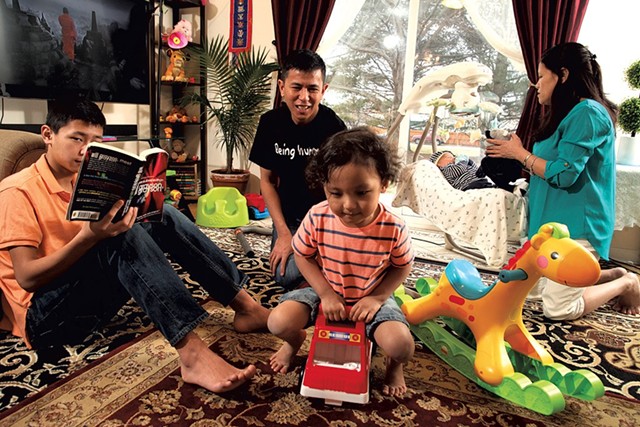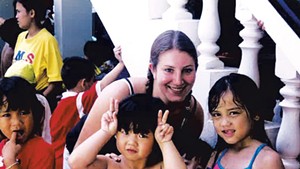
- Matthew Thorsen
- Dad: Hemant Tamang-Ghising, 42
Mom: Surja Tamang, 40
Kids: Sons Hessain, 14, Hwang, 3, and Hrimsang, 8 weeks
Bhutan has an ancient, indigenous Buddhist culture and prides itself on striking a balance between the spiritual and the material. In the early 1990s, the country became a place of instability and danger due to ethnic conflict.
In 1992, Hemant Tamang-Ghising was one of more than 100,000 refugees who fled Bhutan. He and his parents spent two months in India before making their way to a refugee camp in Nepal, where he met and fell in love with Surja. They married in 1998 and had their first son, Hessain, in 2001.
Surja completed 10th grade in the refugee camp, the highest grade available there. And although Hemant had no dreams of being a teacher, his patient and gentle temperament suited him to the job. He started teaching English and social studies to kindergarteners in the camp in 1994, an experience that put him on the path to becoming an educator.
Hemant traveled back and forth from Nepal to India, first to finish high school and then to the University of North Bengal, where he earned his BA in 2001. He was soon hired as an assistant principal back in the camp — in a school with 32 classes of 55 students each.
In 2003 he earned his teaching degree and moved with his family to Kathmandu, Nepal, to teach social studies at a grade 1-12 school where he eventually became assistant principal.
In 2008, Hemant and Surja applied for resettlement in the U.S. They arrived in Burlington in 2011, and Hemant quickly found work as a paraeducator at Flynn Elementary School. He was later hired for his current position as an administrative assistant for the grants and after-school programs for the Burlington School District.
Along with working full time, Hemant is a second-year doctoral student in educational leadership and policy studies at the University of Vermont. He also volunteers at the Vermont Bhutanese Association; co-facilitates the "speaking with confidence" training program at Mercy Connections; is on the City of Burlington's Diversity and Equity team and the Partnership for Change steering committee; and recently started a group for refugees and immigrants called the New American Learning and Sharing Forum. In summer and fall he works part time as a referee for the Vermont Soccer Association.
Surja, who speaks limited English, graduated from a childcare-training course through the Association of Africans Living in Vermont in 2015. She worked at the Converse Home until she had her third son this past December and is now the family's primary caregiver.
A typical morning at the Tamang home:
Hemant: Wake up at six o'clock, get myself ready. I have to wake my elder son up more than three times! I put on the light. Then I go to the bathroom and brush my teeth, then go back to his room, knock on the door and ask him to wake up. The 3-year-old doesn't always wake up, so I have to wake him up. We have to go back and forth to two rooms waking up the boys, then my wife takes care of breakfast and lunch for the kids. She has to be like a policeman. [Surja laughs] That's part of her job, so I can take care of waking up the children, and she makes sure they have eaten and get dressed. It is very hard sometimes, and the elder one sometimes misses the bus. Then I have to drop him first and then the other one [at daycare], then I go to work.
On setting an example for the children:
Hemant: Whenever I think about moving forward in the world, [I ask myself,] How are people around me going to benefit from my presence? From my work? With my services? It's not about, How can I be best? I don't have that kind of thinking. I have a thinking of collaboration, of community. As a Buddhist, we believe in compassion: be compassionate, be a good listener, be loyal, give others a chance. I am trying to be a role model for my kids, to be an example, to show them things are possible, and then it's easier for me to say, "I went through this process," so I can guide my sons.
On Surja spending long days on her own:
[Hemant leaves early for work, and spends Tuesday and Wednesday evenings at his doctoral classes]
Surja: Normal. I am used to it.
Hemant: She often tells me I won't be getting a wife like her!
On partnership:
Hemant: Without her, my life would be very difficult. I can say that my achievement, and my successes, must also be shared with my wife. I have a lot of time to be involved in voluntary work because she takes care of everything at home — looking after babies, cooking, cleaning. She is the "king of the home."
On balance:
Hemant: Sometimes, where the needs are, I put my studies aside. Kids are very important; I am doing this all for the kids, for the family. Some days are very stressful. I have a lot of assignments, so I am consoled by being with my family, talking with them, playing with them. That helps me a lot. Family is not stressful for me. I am going to school, they are also part of my studies. They help me to lower my stress. At the end of day, this is my family. I am going to be with them. If I am selfish and only going for my studies, that's not going to be meaningful.











Comments
Comments are closed.
From 2014-2020, Seven Days allowed readers to comment on all stories posted on our website. While we've appreciated the suggestions and insights, right now Seven Days is prioritizing our core mission — producing high-quality, responsible local journalism — over moderating online debates between readers.
To criticize, correct or praise our reporting, please send us a letter to the editor or send us a tip. We’ll check it out and report the results.
Online comments may return when we have better tech tools for managing them. Thanks for reading.